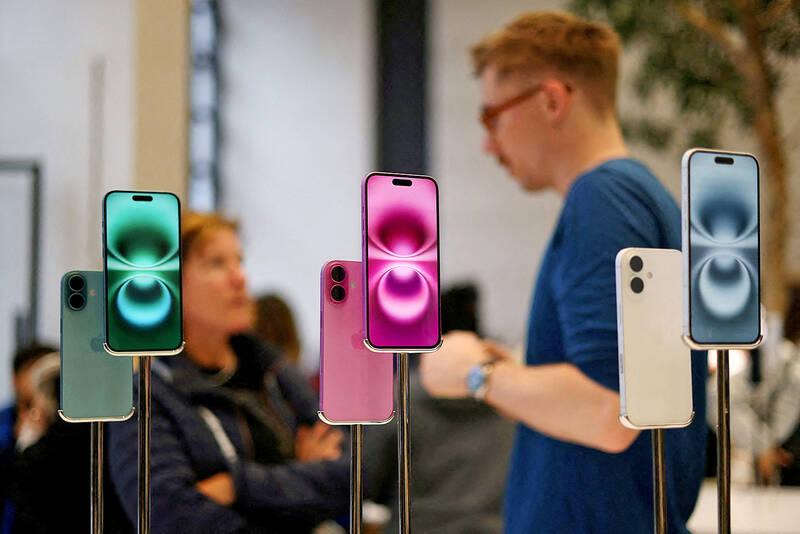Indonesia blocked Apple Inc from selling its latest iPhones in Southeast Asia’s largest economy, saying the company has yet to meet local investment requirements.
The iPhone 16, launched last month, cannot be marketed domestically as local unit PT Apple Indonesia has not fulfilled the country’s 40 percent domestic content requirements for smartphones and tablets, the Indonesian Ministry of Industry said in a statement on Friday.
Apple’s older products can still be sold in Indonesia.

Photo: Reuters
That is a road bump for Apple, which has enjoyed healthy initial sales of its flagship product in other Asian markets such as China. While Apple ranks outside the top six smartphone brands in Indonesia, it is a potential growth market with a young, increasingly tech-savvy population. The US$1 trillion economy has more than 350 million active mobile phones — much more than the nation’s 270 million population, Indonesian government data shows.
The ministry earlier this month said that Apple has only invested 1.5 trillion rupiah (US$95.3 million) in Indonesia, below its commitment of 1.7 trillion rupiah.
Apple built four developer academies in the country in lieu of establishing a local manufacturing facility, though chief executive officer Tim Cook said in April that the company was looking into the feasibility of doing so.
Rival phone makers like Samsung Electronics Co and Xiaomi Corp (小米) have set up factories in Indonesia to comply with the domestic content regulations introduced in 2017. Other ways to boost local content include sourcing materials or hiring workers in the country.
Indonesia has a long track record of using trade restrictions to push foreign companies to produce more of their goods domestically.
The government tightened import rules on a wide swathe of products this year, leading to a shortage of items such as laptops and car tires, and causing a pile-up in its ports.
However, its long-running ban on the export of mineral ores like nickel has led to the rapid development of its battery sector.
About 9,000 iPhone 16 units have so far entered Indonesia, hand-carried by passengers and crew or delivered by post, the ministry said.
These are only allowed for personal use and cannot be traded, it said.
Even this route might not be easy for interested iPhone 16 buyers. Indonesia has since 2020 required all phones purchased overseas to be registered with the government and those are subject to a hefty tax.

When an apartment comes up for rent in Germany’s big cities, hundreds of prospective tenants often queue down the street to view it, but the acute shortage of affordable housing is getting scant attention ahead of today’s snap general election. “Housing is one of the main problems for people, but nobody talks about it, nobody takes it seriously,” said Andreas Ibel, president of Build Europe, an association representing housing developers. Migration and the sluggish economy top the list of voters’ concerns, but analysts say housing policy fails to break through as returns on investment take time to register, making the

‘SILVER LINING’: Although the news caused TSMC to fall on the local market, an analyst said that as tariffs are not set to go into effect until April, there is still time for negotiations US President Donald Trump on Tuesday said that he would likely impose tariffs on semiconductor, automobile and pharmaceutical imports of about 25 percent, with an announcement coming as soon as April 2 in a move that would represent a dramatic widening of the US leader’s trade war. “I probably will tell you that on April 2, but it’ll be in the neighborhood of 25 percent,” Trump told reporters at his Mar-a-Lago club when asked about his plan for auto tariffs. Asked about similar levies on pharmaceutical drugs and semiconductors, the president said that “it’ll be 25 percent and higher, and it’ll

NOT TO WORRY: Some people are concerned funds might continue moving out of the country, but the central bank said financial account outflows are not unusual in Taiwan Taiwan’s outbound investments hit a new high last year due to investments made by contract chipmaker Taiwan Semiconductor Manufacturing Co (TSMC, 台積電) and other major manufacturers to boost global expansion, the central bank said on Thursday. The net increase in outbound investments last year reached a record US$21.05 billion, while the net increase in outbound investments by Taiwanese residents reached a record US$31.98 billion, central bank data showed. Chen Fei-wen (陳斐紋), deputy director of the central bank’s Department of Economic Research, said the increase was largely due to TSMC’s efforts to expand production in the US and Japan. Investments by Vanguard International

WARNING SHOT: The US president has threatened to impose 25 percent tariffs on all imported vehicles, and similar or higher duties on pharmaceuticals and semiconductors US President Donald Trump on Wednesday suggested that a trade deal with China was “possible” — a key target in the US leader’s tariffs policy. The US in 2020 had already agreed to “a great trade deal with China” and a new deal was “possible,” Trump said. Trump said he expected Chinese President Xi Jinping (習近平) to visit the US, without giving a timeline for his trip. Trump also said that he was talking to China about TikTok, as the US seeks to broker a sale of the popular app owned by Chinese firm ByteDance Ltd (字節跳動). Trump last week said that he had